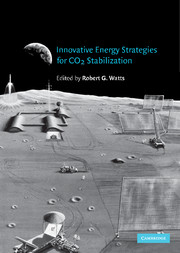Book contents
- Frontmatter
- Contents
- List of contributors
- 1 Concerns about Climate Change and Global Warming
- 2 Posing the Problem
- 3 Adaptive Strategies for Climate Change
- 4 Energy Efficiency: a Little Goes a Long Way
- 5 The Potential of Renewable Energy to Reduce Carbon Emissions
- 6 Carbonless Transportation and Energy Storage in Future Energy Systems
- 7 What Can Nuclear Power Accomplish to Reduce CO2 Emissions
- 8 Nuclear Fusion Energy
- 9 Energy Prosperity Within the Twenty-first Century and Beyond: Options and the Unique Roles of the Sun and the Moon
- 10 Geoengineering the Climate: History and Prospect
- Index
3 - Adaptive Strategies for Climate Change
Published online by Cambridge University Press: 22 October 2009
- Frontmatter
- Contents
- List of contributors
- 1 Concerns about Climate Change and Global Warming
- 2 Posing the Problem
- 3 Adaptive Strategies for Climate Change
- 4 Energy Efficiency: a Little Goes a Long Way
- 5 The Potential of Renewable Energy to Reduce Carbon Emissions
- 6 Carbonless Transportation and Energy Storage in Future Energy Systems
- 7 What Can Nuclear Power Accomplish to Reduce CO2 Emissions
- 8 Nuclear Fusion Energy
- 9 Energy Prosperity Within the Twenty-first Century and Beyond: Options and the Unique Roles of the Sun and the Moon
- 10 Geoengineering the Climate: History and Prospect
- Index
Summary
Introduction
This book presents forecasts for a range of innovative energy technologies that might help stabilize atmospheric concentrations of greenhouse gases during the course of the 21st century. These forecasts provide a wealth of important information for those who wish to inform their view of the climate-change problem and the actions governments or the private sector might take to address it. But these chapters nonetheless present a fundamental dilemma – for the one thing we know for sure about forecasts is that most of them are wrong. How then should we use the information in this book to shape policy?
The difficulty resides not so much in the forecasts themselves as in the methods that we commonly employ to bring the information they contain to bear on adjudicating among alternative policy choices. Generally, we argue about policy by first settling on our view of what will happen in the future and then by using this understanding to decide what actions we should take in response. For instance, if we came to believe, through arguments such as those in this book, that there were cost-effective technological means to stabilize greenhouse-gas emissions, we might be more likely to support policies that sought to achieve such a stabilization. We often make these arguments nonquantitatively, even if systematically. There are also a host of powerful mathematical tools, based on the mathematical techniques of optimization, that help us systematize and elaborate on this style of thinking about the future.
- Type
- Chapter
- Information
- Innovative Energy Strategies for CO2 Stabilization , pp. 45 - 86Publisher: Cambridge University PressPrint publication year: 2002
- 3
- Cited by



